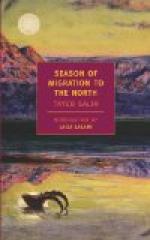A new duty has been taken on by Miss Gordon,—the reading of the rain-gauge just installed by the Canadian Government. Slyly taking a peep into her records, we feel that they will have to be adjusted to the latitude of Ottawa when they get there, for with a true Northern contempt for fractions she has made all the decimals read as full fractions. The outside world which feasts on blue-books is apt in the future to be startled at the generous precipitation accorded Fort McMurray! Miss Gordon’s ambitions run in other lines than the mathematical. Holding us by both hands as we bade good-by, she said, “Oh, that I were young again, I would learn, learn, learn. I would learn medicine so that I could help these poor creatures.” Her tone of unselfish sincerity we carry with us as we make our way back to the scows, bearing with us, as token of good-will from the Gordon garden, radishes and lettuce for an evening salad.
Next morning we start bird-hunting on our own account, and get a pair of pictures as striking as those we have Miss Gordon to thank for—a Foxsparrow on the nest, then the baby sparrows but one day old. If any one thinks it easy to find and photograph birds’ nests in the heart of the ancient wood on Athabascan banks in mosquito time he has “another guess coming.” The mosquito here is not a joke, not a theorem, but a stinging entity. During the five days we are at Fort McMurray the potatoes in Miss Gordon’s garden have grown as many inches, literally an inch a day. Wood violets, wild roses, false Solomon-seal, and the wild sarsaparilla are everywhere; the air is full of the scent of growing things.
[Illustration: The Steamer Grahame]
Fort McMurray is the parting of the ways where the Hudson’s Bay Company’s steamer Grahame meets us, bringing her tale of outward-going passengers from the North. The journey of these people from Fort McMurray to The Landing is going to be a very different thing from the easy floating with the current that we have enjoyed. All northern rivers are navigated against stream by “tacking,” that is, towing the boats, weary mile after mile, “by the power o’ man,” the half-breed boatmen scrambling now on the bank, now in the water, tugging the heavily-laden craft after them. It is a mode of transportation that neither written word nor camera can do justice to. We shake hands with those going out to civilization and take our dunnage aboard the steamer. The Grahame has its advantages,—clean beds, white men’s meals served in real dishes, and best of all, a bath!
On the Grahame we meet Mr. Harris, of Fond du Lac, who has come thus far to greet the incoming transport and who goes back again with it. Scholarly and versatile, we are to find in Mr. Harris a very mint of Indian lore and woodland wisdom and the most wonderful memory I have ever encountered. All the vicissitudes of a Northern life have failed to rub out one line of the Virgil and Horace of his schoolboy days, whole chapters of which, without one false quantity, he repeats for us in a resonant voice. He can recite the whole of “Paradise Lost” as faultlessly as Macaulay was credited with being able to do. If Mr. Harris could be induced to write a story of the North it would put to shame all the weak efforts of one-season visitors who of necessity see only the surface and have to guess the depths.




